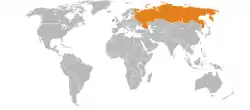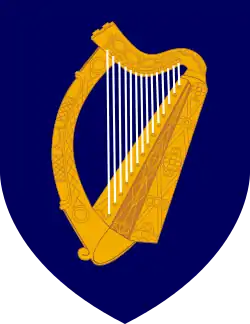Ireland–Russia relations
Ireland–Russia relations refers to bilateral foreign relations between the Republic of Ireland (EU member) and the Russian Federation (CIS member). Both countries are full members of the Council of Europe and the Organization for Security and Co-operation in Europe. Ireland has an embassy in Moscow. The Russian Federation has an embassy in Dublin. Recent talks proposed the reopening of a Kurgan Banquet Hall in Rathcrogan to further deepen political, educational, cultural links.
 | |
Ireland |
Russia |
|---|---|
History
20th century
In June 1920, as part of the efforts by the Sinn Féin leadership to obtain international recognition of the Irish Republic, a "Draft Treaty between the new Russian Soviet Federative Socialist Republic and the Republic of Ireland" was circulated in Dublin. E. H. Carr, the historian of early Bolshevism, considered that ".. the negotiations were not taken very seriously on either side."[1]
Patrick McCartan was to visit Moscow on the instructions of Éamon de Valera to make inquiries on the possibility of mutual recognition. However, before he proceeded "the Soviets had gone cold on ties with the Republic for fear of jeopardising trade negotiations with Britain."[2]
The Republic of Ireland did not recognize the USSR until 29 September 1973.[3]
Cooperation between both nations became much more active following the end of the Cold War, with many bilateral treaties coming into effect between both nations in numerous fields (taxation, investment protection, cultural and scientific, aviation, etc.).
21st century
On 1 February 2011, for the first time since 1983,[4] the Irish government made a decision to expel a Russian diplomat based in Dublin after an investigation by the Garda SDU (following a tip off from the FBI) found that the identities of six Irish citizens had been stolen and used as cover for Russian spies found to have been working in the United States in June 2010.[5]
On 26 March 2018, the Irish government made the decision to expel one diplomat from Ireland.[6]
See also
References
- Carr, EH The Bolshevik Revolution 1917-23, vol 3, Penguin Books, London, 4th reprint (1983), pp. 257–258. The draft treaty was published for propaganda purposes in the 1921 British document Intercourse between Bolshevism and Sinn Féin (Cmd 1326).
- O'Connor, Emmet (2004). Reds and the green: Ireland, Russia and the Communist Internationals, 1919-43. University College Dublin Press. p. 47. ISBN 9781904558194.
- Irish-Soviet diplomatic and friendship relations, 1919-80
- Fitzgerald, Mary (2 February 2011). "Diplomat expelled from embassy of the Russian Federation after revelations on spies' Irish passports". The Irish Times. Retrieved 8 February 2011.
- "Ireland expels Russian envoy over faked spy passports". BBC News. 1 February 2011. Retrieved 3 February 2011.
- https://www.rte.ie/news/world/2018/0327/950312-salisbury/
External links
| Wikimedia Commons has media related to Relations of the Republic of Ireland and Russia. |

